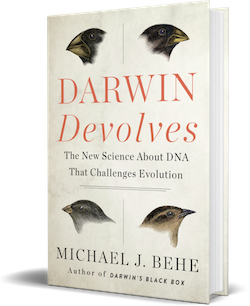 Evolution
Evolution
 Intelligent Design
Intelligent Design
Behe’s New Book, Darwin Devolves — Stunning and Absolutely Convincing


I recently had a lively conversation with a former colleague at the Max Planck Institute for Plant Breeding Research in Cologne. We have been on good terms for more than thirty years now and continue to be so. The subject turned to intelligent design and he stated emphatically: “There is no irreducible complexity,” and “There are no orphan genes.” To which I responded, “Yes, and there is no [my interlocutor’s name], either.”
I thought of this exchange in considering Michael Behe’s forthcoming book. Will it perhaps help our Darwinian friends to somewhat refine their assessments of ID?
ID critics appear to suspect something terrible is about to befall them when Behe’s book, Darwin Devolves: The New Science About DNA That Challenges Evolution, is published on February 26. Some well-known and also lesser-known commentators were already more or less outraged months before publication. See here, here, here, and here for several examples.
What’s the Fuss About?
In his new work Behe has extended his studies on intelligent design to several fields of biology. Instead of regretting and repenting his former arguments — dismissed by Darwinists as “totally wrong,” “completely wrong,” “dead wrong” — he now confirms them yet again: “The firm conclusion I’ve drawn over the past decades is this: despite occasional questions and bumps along the road, the greater the progress of science, the more deeply into life design can be seen to extend.” And “[A]lthough chance affects superficial aspects of biology, the newest evidence confirms that life is the intended work of a mind and that that work extends much more deeply into life than could previously be seen.” He even dares to substantiate his claims by clear and powerful scientific evidence. Outrageous indeed!
In fact, he writes, the book
addresses a very important, pivotal topic on the question of Darwinism versus intelligent design. It will show that not only is Darwin’s mechanisms incapable of building complex structures — that was doubted ever since he first proposed his theory — but it also shows that Darwin’s mechanism actively degrades complex structures, and that in many circumstances that’s helpful to an organism. So, it helps a species survive and it can’t explain where the elegant complexity of life came from.
Mindless Recycling

On a range of topics, evolutionists for more than a century have been mindlessly recycling supposedly indisputable “proofs” against any design in the origins of life in any of its forms. Behe critically examines these “proofs,” held out as unassailable validation and verification of Darwinism. They have not only been found wanting but also, in several cases, are revealed as presenting strong evidence for the exact opposite conclusion, for ingenious design. Among the latter are the inverted retina of the eye, Galápagos finches, honeycreepers, fruit flies, the cichlid fishes, and others.
Regarding the evolution of the systematic categories in question (the finches, for instance, and others), I urge you to check out Behe’s new book. Incidentally, I must admit that I was fascinated that he has come to virtually the same conclusion as I have. Yet he has done so by a totally different approach. (See my book, in German, about Species Concepts, Evolution and Creation.) Concerning the eye, as I have written and as I note that Behe agrees, Darwinian theory substitutes imagining for reasoning. In affirming this, Dr. Behe’s analyses are stunning and absolutely convincing.
Apart from further intriguing comments on Lenski’s famous investigations on bacteria, you will also find deep insights on the multiverse theory, complexity theory, self-organization theory, evo-devo, niche construction, developmental plasticity, natural genetic engineering, the machinery of splicing, major transitions in evolution, game theory, and more.
The First Rule of Adaptive Evolution
As expected, on many of these topics, he presents a detailed extension to his “First Rule of Adaptive Evolution.” He put this forth in 2010, mainly in the context of microorganisms. See “Experimental evolution, loss-of-function mutations, and ‘the first rule of adaptive evolution’,” in The Quarterly Review of Biology 85: 419-445:
Adaptive evolution can cause a species to gain, lose, or modify a function; therefore, it is of basic interest to determine whether any of these modes dominates the evolutionary process under particular circumstances. Because mutation occurs at the molecular level, it is necessary to examine the molecular changes produced by the underlying mutation in order to assess whether a given adaptation is best considered as a gain, loss, or modification of function. Although that was once impossible, the advance of molecular biology in the past half century has made it feasible. In this paper, I review molecular changes underlying some adaptations, with a particular emphasis on evolutionary experiments with microbes conducted over the past four decades. I show that by far the most common adaptive changes seen in those examples are due to the loss or modification of a pre-existing molecular function, and I discuss the possible reasons for the prominence of such mutations.
In Darwin Devolves you’ll find the application of the “First Rule” to macro-organisms as well.
There are many further captivating topics addressed in the book. These include a comparison of flagellum sequences, irreducible complexity (of course), Darwin’s “horrid doubt,” reflections on minds, on a judge’s plagiarism, and many others.
So, will our Darwinian friends perhaps reconsider their views on ID by carefully studying Behe’s book? We’ll see.
As for me, I can only agree with molecular biologist Russel Carlson, in his comment about Darwin Devolves on the book’s Amazon page:
I highly recommend this book to both proponents and skeptics of Darwinian evolution as it will open new avenues of thought and creativity regarding this important subject.
And with protein chemist Douglas Axe:
Behe’s latest masterpiece takes the evidence marshaled in defense of the unbounded power of blind evolution and deftly brings it to the opposite conclusion: evolution is self-limiting by design. Time for the Behe-bashers to retire.
Or as bioengineer Matti Leisola concurs: “The conclusion is clear: life is the product of a mind.”
For further pre-publication reviews, see here, here, and here at Evolution News.
Photo: A red-legged honeycreeper (Cyanerpes cyaneus), by DickDaniels (http://carolinabirds.org/) [CC BY-SA 3.0 or GFDL], from Wikimedia Commons.
